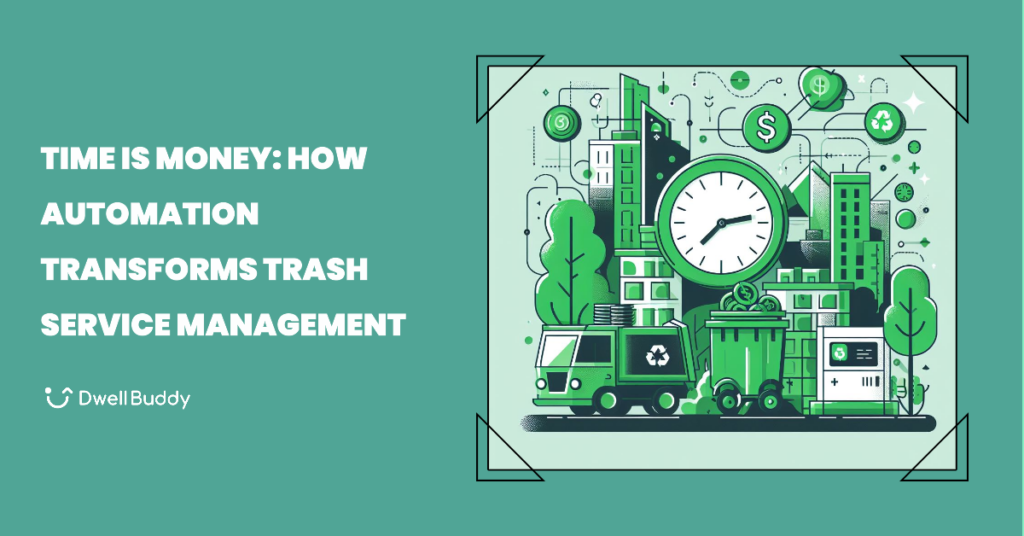
Time is Money: How Automation Transforms Trash Service Management
Traditional garbage collection? Imagine clogged containers, missing pickups, and inefficient roads wasting gas and time. Paper maps and tangible emotions ruled, leading to frustration for all.
Automation changes the game. Consider that intelligent systems provide uniform routes, schedule on-time deliveries, and keep everything running smoothly. This future of the waste industry is efficient, cost-effective, and good for the environment.
Benefits of automation in waste management
Automation provides many benefits for waste management companies, transforming the industry from reactive to proactive. Here are some of the main benefits:
- Improved operational efficiency: Automation simplifies processes, reducing manual processes and errors. Scheduling, route planning, and control of bin-fill levels are automated, freeing up staff for more strategic tasks.
- Reduced Human Errors: Automated systems reduce errors such as failed pickups or incorrect bin operations, resulting in consistent and reliable service
- Increased customer satisfaction: Efficient operations ensure timely collection, reduced overruns and better customer service. Real-time tracking of communication systems can dramatically improve customer experience.
- Environmental benefits: Improved roads reduce fuel consumption and carbon emissions, making them more sustainable. In addition, the automation allows for better sorting and recycling.
How Automation Saves Time
Automation can dramatically reduce the time spent on various tasks, allowing employees to focus on higher-value activities. Here are two outstanding examples.
- Optimization: Use automation tools with real-time traffic data, bin fill levels, and geospatial mapping to optimize waste collection methods. This saves time, and fuel, and reduces vehicle damage.
- Scheduling: Create automated scheduling to ensure timely collection and reduce truck and idle labor time. Predictive analytics can also predict bin fullness and adjust policies accordingly
How Automation Saves Money
The economic advantages of automation are sizable. Here’s the way it facilitates keeping cash:
- Lower labor costs: Automation reduces the amount of manual labor needed in some areas, saving wages and benefits. However, this does not end things; Staff must be highly skilled to monitor and analyze automated systems.
- Fuel efficiency: Making roads more efficient through automation reduces fuel consumption, leading to significant cost savings, especially when fuel prices fluctuate
- Maintenance savings: Scheduling can predict the need for assembly vehicles based on data, preventing unexpected downtime and reducing the cost of the maintenance of the
Implementing Automation inTrash Management
A successful transition to automation requires careful planning and execution. Here are the key steps:
- Analysis: Review your current operations to identify areas where automation can have the most impact. Consider factors such as route complexity, fleet size, and customer volume.
- Invest: Analyze and invest in automation technology that fits your company’s needs and budget. Solutions are available, from route optimization software to smart bin sensors.
- Training: Provide comprehensive training to employees to ensure they are comfortable and competent in using the new automated system. This creates a culture of acceptance and helps employees use automation to be more productive.
- Integration: Seamlessly integrate automation tools into existing systems and workflows. This improves data flow and avoids the creation of data silos.
- Monitor and Optimize: Continuously monitor and optimize automated processes to ensure they deliver maximum performance and cost savings. Analyze data to identify areas for further improvement and adjust your automation process.
Conclusion
Automation is not static; It’s the future of waste management. Companies can benefit greatly by embracing automation:
- Save time and resources
- Reduce costs
- Increase overall efficiency
- Stay competitive in the industry
- Provide excellent service to your customers
- Help create a sustainable waste management system
By adopting an automation approach, waste management operators can ensure a more sustainable, efficient, and customer-focused future. Not only does this benefit their economy, it also helps provide a cleaner, greener environment for everyone.

